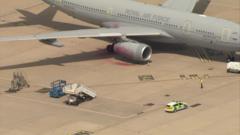Who Was Arrested in the RAF Brize Norton Break-In?

Understanding the Recent Break-In at RAF Brize Norton
The recent break-in at RAF Brize Norton has raised serious concerns regarding security protocols at military installations in the UK. This incident, which resulted in significant damage to two military aircraft, has been linked to a group known as Palestine Action. The implications of this act of vandalism extend beyond the immediate damage, prompting discussions about terrorism, activism, and government responses to perceived threats.
The Incident: A Timeline of Events
In June, two activists managed to infiltrate the RAF Brize Norton airbase under the cover of darkness. Armed with spray paint and crowbars, they caused an estimated £7 million in damage to two RAF Voyager aircraft. Video footage of the break-in revealed one of the activists riding a scooter towards the aircraft, where they proceeded to spray paint into the jet engine.
The audacity of the break-in raised alarms about the effectiveness of security measures in place at UK military bases. It led to an immediate government review of security protocols across all military installations, emphasizing the need for enhanced safeguarding against similar incidents in the future.
The Arrests: A Growing List of Suspects
Since the incident, counter-terrorism police have made several arrests, with the latest being a 22-year-old man apprehended in Bedford. This marked the seventh arrest related to the break-in, and the police have charged four individuals with serious offenses. These charges include conspiracy to commit criminal damage and conspiracy to enter a prohibited place knowingly for purposes detrimental to the UK's safety.
- Amy Gardiner-Gibson, 29
- Jony Cink, 24
- Daniel Jeronymides-Norie, 35
- Lewie Chiaramello, 22
The government has taken a hard stance on these actions, leading to the proscription of Palestine Action as a terrorist organization. This designation means that supporting or being a member of the group is now considered a criminal offense. The repercussions of this designation have sparked widespread protests across the UK, with many activists voicing their opposition to the government's actions.
Palestine Action: A Closer Look
Palestine Action has emerged as a controversial group known for its direct action tactics against arms companies, particularly in light of the ongoing conflict in Gaza. The group's actions are framed as protests against military involvement and the arms trade, which they believe contribute to violence and suffering in Palestine.
Critics of the government's decision to label Palestine Action as a terrorist organization argue that this move stifles legitimate protest and dissent. They claim that the government is misusing anti-terrorism laws to suppress activism rather than addressing the underlying issues that drive such actions.
The Legal Battle Ahead
In a significant development, the founder of Palestine Action has been granted permission to challenge the proscription legally. This case will be heard in November, and it is expected to draw considerable public interest. The outcome could set a precedent for how the government handles activist groups and their methods.
Implications for Security and Activism
The events surrounding the break-in at RAF Brize Norton not only highlight security vulnerabilities but also raise important questions about the balance between national security and the right to protest. As the government tightens its grip on groups like Palestine Action, the implications for civil liberties and activism in the UK become increasingly complex.
Government Response to Security Threats
The government’s swift action to review security measures at military bases reflects a heightened awareness of potential threats to national security. With the rise of activism that targets military infrastructure, there is a pressing need for robust strategies to manage security risks while respecting the right to peaceful protest.
- Increased surveillance at military installations
- Regular security audits and reviews
- Enhanced training for security personnel
While these measures aim to protect national interests, they also risk infringing on the rights of individuals to express their views. Striking a balance between these competing interests will be a significant challenge for policymakers in the coming years.
The Role of Activism in Shaping Policy
Activism has historically played a key role in shaping public policy and bringing about social change. The actions of groups like Palestine Action highlight the tension between government authority and grassroots movements. As activists continue to challenge military policies and practices, the discourse surrounding national security and civil rights is likely to evolve.
It is essential for the public to engage in discussions about these issues and consider the implications of government actions on individual freedoms. The debate surrounding Palestine Action serves as a reminder of the power of activism in influencing the political landscape.
Conclusion: The Path Forward
The break-in at RAF Brize Norton has sparked a series of events that raise important questions about security, activism, and government authority. As the legal challenges unfold and public sentiment shifts, it will be crucial for all parties involved to navigate these complex issues thoughtfully.
As we look forward, one must ponder: How can we ensure that national security measures do not undermine the fundamental rights of individuals to voice their dissent? The balance between security and freedom remains a delicate one, and the future of activism in the UK may depend on the outcomes of these legal and political battles.
FAQs
What happened during the break-in at RAF Brize Norton?
The break-in involved activists damaging two RAF Voyager aircraft, causing an estimated £7 million in damages using spray paint and crowbars.
Who has been arrested in connection to the incident?
As of now, seven arrests have been made, with four individuals charged with serious offenses related to the break-in.
What is Palestine Action?
Palestine Action is a group known for its direct action against arms companies, particularly in response to the ongoing conflict in Gaza.
What are the implications of the proscription of Palestine Action?
Being proscribed as a terrorist organization means that membership and support for Palestine Action are now considered criminal offenses, raising concerns about civil liberties and the right to protest.
What legal challenges are ahead for Palestine Action?
The founder of Palestine Action has been granted permission to challenge the government’s proscription legally, with the case expected to be heard in November.
As the situation continues to develop, it raises critical questions about the role of activism in a democratic society. Will governments adapt to protect both national security and the rights of individuals to protest? #Activism #Security #CivilRights
```Published: 2025-08-02 11:21:10 | Category: technology



